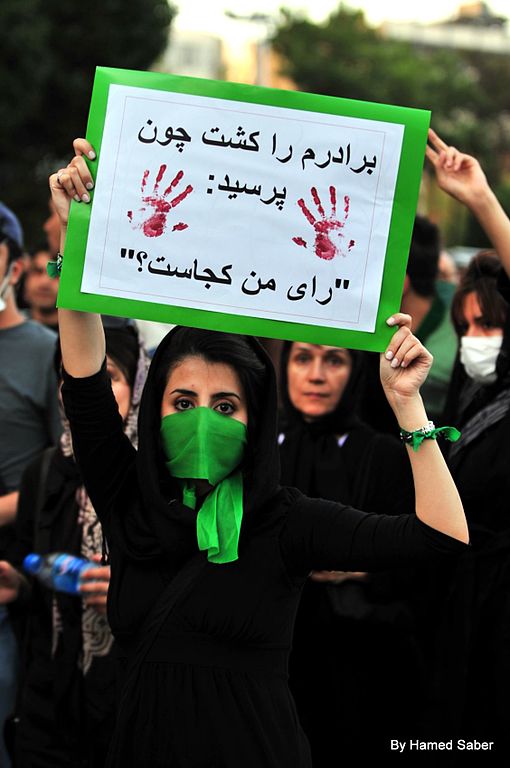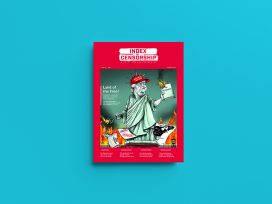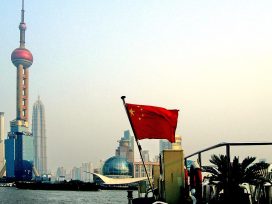Can Islam do democracy? This was the question occupying the headlines at the height of the revolutionary events in Egypt in 2011. With the success of the Muslim Brotherhood in the Egyptian parliamentary elections in November, it has become all the more pressing.

Source: Hamed Saber/Flickr/Wikimedia
In fact, a great deal of thinking and writing on democracy has taken place in the Islamic world in recent decades. This is particularly so in Iran, where the attitudes towards democracy have undergone a substantial change over the years. While democracy was viewed overwhelmingly negatively by numerous intellectuals of note during the 1960s and 1970s, by the beginning of the 1990s several prominent thinkers had clearly begun advocating democracy. The change was first of all a result of the deterrent example of actually existing anti-democratic Islamism under Ayatollah Khomeini. Beyond that, however, this emergent intellectual movement, which I shall refer to as democratic post-Islamism, was in need of a sound theoretical framework. In a state where democracy and human rights are – in accordance with Khomeini’s dictum – regarded as un-Islamic, opponents of this view had to provide a reason for why democracy and human rights are indeed Islamic, or at least are not in contradiction with Islam. Before explaining the development of this theoretical framework, I will first turn to the situation 50 years ago.
Democracy and violence
Anti-democratic discourse in Iran during the 1960s and 1970s was triggered by one decisive event: the coup d’etat staged by the CIA in 1953 overthrowing the prime minister Mohammad Mossadegh. This event shaped a whole religion’s attitude towards the West and hence also towards democracy. The USA together with Britain removed Mossadegh because he had nationalized the Iranian crude oil reserves and returned the exile dictator Mohammad Reza Pahlavi to the peacock throne. Aided by the US, the Shah subsequently built up a dictatorial regime, discrediting the democratic West in the eyes of many Iranian intellectuals for many years to come.
Mohammad Hussayn Tabatabaei (1903-1981) produced his writings on democracy very much as a reaction to these events. The honourable title of Allameh (“the great scholar”) is given to Tabatabaei in Iran for having written the most important twentieth-century Shia commentary on the Qur’an, the Tafsir al-mizan. As a philosopher, Tabatabaei was a member of a discipline that had little standing in the eyes of the clerical establishment and for that reason gained all the more respect from young clerics. In 1961, Tabatabaei published a text on the political rule of the clerics. Until that point, any clerico-political leadership had been deemed illegitimate until the return of the twelfth Imam. Hossein Borujerdi, probably the most important religious authority of the 1950s, declared that clerics were not to rule but to wait patiently; secular rule was to be respected. Nevertheless, Borujerdi thought that a monarchy was likely to provide more continuity and respect for Islamic law than a republican system, and banned any other view. Most clerics, including Ayatollah Khomeini, accepted this position without questioning.
However, Borujerdi’s death in 1961 triggered a debate as to who constituted the legitimate ruler of a Shia state. Tabatabaei’s position must be understood against the background of an Iranian “constitutional” monarchy that merely pretended to be democratic: Iran had a prime minister, elections and a parliament. Tabatabaei assumed, or claimed to assume, that a state that functioned along these lines corresponded with the western idea of democracy. After all, the Shah was massively supported by the West. Since the Iranian system claimed to be a democracy yet was still tyrannical, Tabatabaei renounced democracy altogether. “Over half a century ago, we accepted the reign and rules of democracy and took our place among the progressive western countries,” he wrote. “But we can see how our condition is deteriorating and gets worse from day to day. This tree, which bears blessings and fruits for others, yields for us only the fruit of misfortune and shame.”
Tabatabaei did not directly demand political leadership by the Islamic jurists. However, he declared that he deemed democracy to be discredited as a form of rule. On the other hand, the people needed some sort of authority that would take care of the citizens as a guardian takes care of orphans. This guardian would have to be a jurist, because only jurists are just. The mandate to rule (velayat) over the people would be his in accordance with the law of Islam.
The reception of western cultural criticism
In this line of thought, Islamic rule and structure of the state was obviously developed in opposition to western democracy. However, the fundamental question of whether one should emulate the West and its system of rule or find one’s own system was not only discussed by clerics. The West, its ideas and cultures as well as their effect on Iran was also the most important subject of debate among secular intellectuals at this time. Secular intellectuals were inspired by and at the same time critical of the West during those years. After Hiroshima and Vietnam, Algeria, the Cold War and Soviet expansionism, the ideas of both liberalism as well as socialism had lost their attraction. Many Iranian thinkers agreed with the criticism voiced by western intellectuals such as Albert Camus, Erich Fromm, Herbert Marcuse and Jean-Paul Sartre.
This was particularly true for Jalal Al-e Ahmad (1923-1969), who translated several of these authors into Persian. In 1962, Al-e Ahmad published his essay “Gharbzadegi” (“Weststruckness”, literally “being struck by the West”). In it, he says: “I say that gharbzadegi, being struck by the West, is like cholera. Or if you don’t like that, like sunstroke or like a frostbite. But no. It’s at least as bad as sawflies. Have you ever seen how they infest wheat? From within. There’s a healthy skin, but it’s only a skin, like the shell a butterfly leaves behind on a tree. In any case, it is a disease.”
If there is one single most influential text in modern Iranian history, then “Gharbzadegi” is generally considered to be it. It is seen as the “holy book” of several generations. For more than two decades, the essay provided Iranian social criticism with its basic terminology and gave the anti-western disposition of the debate its essential thrust. Al-e Ahmad’s theses shaped all Iranian intellectuals, so that on the eve of the Islamic revolution of 1979 there was probably nobody who doubted the truthfulness of Al-e Ahmad’s analysis of Iranian society.
Al-e Ahmad claimed that the unthinking appropriation of western behaviour and ideas was a disease afflicting Iran. Although he did not attack democracy directly with this claim, he did consider Islam to be the only authentic component of Iranian culture. Before a surprised, secular public, Al-e Ahmad explained the potential of religion and declared the clergy to be most important part of Iranian identity: the clerics, he said, were the only ones to have resisted western influence. Only Islam was able to avert the Christianization, colonization and exploitation of Iran by the West.
Progress through revolution
As the most important secular intellectual of the 1960s, Al-e Ahmad’s positive view of Islam paved the way for the influential critics of democracy of the 1970s. Ali Shariati (1933-1977) was a decisive influence for the generation that a little later would try to shake off western influence through an Islamic revolution. One of Shariati’s most influential texts, Ommat va emamat (“Islamic community and imamate”) follows exactly the same line of attack as Tabatabaei’s essay and the famous 1971 lecture on Islamic government by Ayatollah Khomeini: all three base their rejection of democracy and advocacy for Islamic government on a blanket criticism of the West. Regardless of their naïvety regarding the government they described as Islamic and the inaccuracy of their definition of western democracy, their severe attack on the West and the idea of democracy, together with their exultation of the “wise leader”, sufficed to turn a whole generation of students towards Islamism.
Ali Shariati wrote that although the West claimed that democracy was the form of statehood that most heeded human rights, in reality it merely appropriated human rights for itself: “It was governments that were democratically elected, governments that believed in liberalism, that we have to thank for colonialism – which brought with it the mass murder of peoples, the destruction of cultures, treasures, histories and civilisations of non-Europeans. These crimes were not committed by priests, inquisitors and Caesars, they were committed in the name of democracy and western liberalism.”
Shariati’s criticism of democracy was not based only on how democrats acted, however. His objections were primarily aimed at democracy as a form of government for Iran. Democracy, he argued, was not necessarily in the interest of the masses in all societies and at all times. According to Shariati, under democracy Iran would not be able to achieve what in his opinion was the most important thing: progress. Ironically, while Shariati wanted revolutionary change, he deemed it unthinkable that the Iranian people would vote for a government that would bring this about, in his opinion an Imamite leadership. Thus Shariati deemed even totalitarian politics supportable, since the revolution would otherwise not hold a chance against the existing powers.
Following the revolution of 1978/1979, the next thinker to contribute to the imams’ assertion of single rule was Ayatollah Khomeini himself. During the 1960s, Khomeini’s criticism of the government of the Shah had been aimed at the increasing state control of the judiciary, at secularisation and the weakening of Islamic institutions, and at state repression and US influence. It was this criticism that resulted in Kohmeini being sent into exile in Najaf. The series of lectures he held there in the winter of 1971 was published under the title “The Islamic Government” (Hokumat-e eslami). It contains Khomeini’s key ideas on the formation of an Islamic state according to the directives of Islamic law. Large parts of the lecture read like an anti-imperialist polemic, however: Khomeini claimed that the only true Iranian identity was Islamic, hence only a return to Islam could save the country.
This led Khomeini to attack the clerics for staying out of politics. He accused the theological colleges of teaching a wrong, apolitical, Islam. The clerics had adopted a colonialist position, he said, and had come to believe what exploiters, oppressors and colonialists would have them believe: that religion and politics ought to be separated. In fact, Khomeini countered, it had been agreed among clerics for centuries that they were to take on political leadership. He based this claim on the following line of argumentation: “First, he [the prophet] himself established a government, as history testifies. […] Second, he designated a ruler to succeed him, in accordance with divine command. If God Almighty, through the Prophet, designated a man who was to rule over Muslim society after him, this is in itself an indication that government remains a necessity after the departure of the Prophet from this world. Again, since the Most Noble Messenger promulgated the divine command through his act of appointing a successor, he also implicitly stated the necessity for establishing a government.”
Khomeini went on to argue that God himself revealed the penal law. Hence, he claimed, this law must be applied. Here, Khomeini deliberately ignored the view held by most clerics that the application of the penal law is one of the privileges of the hidden Twelfth Imam and that the traditional Shia understanding is thus that this law is suspended during the Major Occultation.
What is more important than his disputed line of reasoning, however, is that Khomeini was able to play the role outlined by Shariati perfectly. During the 1970s, everyone hearing or reading Shariati’s statements on imamite leadership would automatically think of Khomeini – the rebellious cleric ranting against the Shah from Iraq. Shariati’s writing recruited an enormous group of followers for Khomeini. He had the reputation of being a man of the world, was a stirring orator, charismatic and had studied in Paris. Thousands hung on his words when he spoke at the Tehran meeting place Hosseini-ye ershad. Shariati, on the other hand, was far from advocating leadership by a jurist of Khomeini’s style. He also certainly did not imagine a cleric as the prototypical “political leader”, since he generally held a very critical view of the clergy. We cannot even ascertain for sure whether he even knew of Khomeini’s 1971 lectures. The one thing both had in common was the conviction, also shared by their countless followers, that the concept of democracy could not be translated into the Iranian context either practically or theoretically. The idea of a “philosopher state”, on the other hand, had much more success during the 1970s. The result was massive hostility to democracy in pre-revolutionary Iran and in the 1979 establishment of the so-called velayat-e faqih, the rule of the Supreme Leader.
Iran today
Iran has been calling itself the Islamic Republic of Iran since 1978/79. Khomeini explicitly rejected the term “Democratic Islamic Republic” prior to the referendum on the future form of government. He declared that the nation wanted not a republic, not a democratic republic, not an Islamic democratic republic but an Islamic republic. As part of a purely western terminology, the word “democratic” was not to be used. Khomeini neglected to mention, of course, that “republic” is also a western concept.
Since 1979, when Khomeini formulated his rejection of democracy, Iran has become no more democratic. However the Iranian discourse on democracy has undergone a complete change. Mohammad Mojtahed Shabestari serves as an illuminating example. Shabestari, born 1936, is one of the most important contemporary thinkers in Iran. He was intellectually socialized by Shariati, Tabatabaei and Khomeini, but later emancipated himself from their views. Shabestari bases his advocacy for democracy on several grounds. Democracy, he argues, is not contrary to the will of the Creator, as Khomeini claimed. Quite the opposite, democracy is able to realise what was demanded of the ideal government by the first Shia Imam Ali. Ali, the cousin and son-in-law of the Prophet Mohammed, appointed Kalif Malik al-Ashtar as governor of Egypt, providing him with an instruction on proper government. This document retains its relevance despite doubts cast on its authenticity by western Islam scholarship. Regardless of disputes on its authenticity, the instruction holds a central position in Shia state philosophy. In it, Ali explains to his governor how he should rule in order to be sure of God’s pleasure. The instruction is considered the ideal for good governance in Shia Islam.
Shabestari’s claim is certainly supported by the content of the instruction, which states that rule must above all be just. The instruction does not, however, include more detailed or concrete instructions – such as the requirement to apply the penal law mentioned in the Qur’an, as Khomeini had claimed. Shabestari emphasized the importance of this omission. Shia Muslims consider Ali, the first Shia Imam, to be the most important Qur’an interpreter. If Ali did not clearly instruct his governor to apply, for example, the ius talionis (retributive justice) or the hadd punishments of Sharia, then he obviously did not interpret the Qur’an to be stating as much. Instead, Ali writes to his governor: “Oh Malik, do justice to Allah and to mankind. Whoever tyrannizes and oppresses the creatures of Allah, will earn enmity of Allah along with the hatred of those whom he has oppressed. Oppression and tyranny over the creatures of Allah is the worst that can happen to a people and will surely invoke the wrath of Allah and his retribution. Remember, Malik! that there is nothing in this world more effective to turn His Blessings into His Wrath quicker than to insist upon oppression over His creatures because the Merciful Allah will always hear the prayers of those who have been oppressed .”
Shabestari went on to say that, empirically, democracy is the form of government that most effectively prevents oppression and tyranny – and hence fulfils Imam Ali’s most important criteria for good governance. For Shabestari, it is decisive that democracy is a form of rule that prevents tyranny – and creates justice. With this line of reasoning, he places himself fully within the constitutionalist school of thought of Iran in 1906-1911.
Abdolkarim Soroush (b.1945), arguably the most notable intellectual in Iran today, holds a similar view. Soroush, who had the same socialisation as Shabestari, turned his back on Islamism at the beginning of the 1990s and began to propagate the idea of a so-called hokumat-e demukratik-e dini – a religious-democratic government. In his opinion, a government can be both religious and democratic, because religious rules that are in contradiction with democracy can be reinterpreted. Soroush has advocated this in numerous writings, supporting his argument with the theory of the “theoretical narrowing and widening of Sharia”.
Religious democracy as imagined by Soroush does not differ from ordinary western democracy; its acceptance of human rights is absolute and not conditional. That is remarkable in itself, given that Ayatollah Khomeini called human rights a “collection of corrupt norms” thought up by Zionists in order to destroy all true religions. Much in the same spirit, Iran, Sudan, Pakistan and Saudi-Arabia criticised the General Declaration of Human Rights for failing to include cultural and religious references to non-western countries. To many, the Declaration was merely a secular interpretation of the Judaeo-Christian tradition that, were it to be adopted by Muslims, would amount to a breach of Islamic law.
Religion as society’s spirit and conscience
Soroush argues that there are extra-religious or meta-religious values and rights that pertain as a matter of principle. Fundamentally, no reasonable dictate or law can contradict religion – and particularly not Shia Islam, which is especially reason-bound. Take just one example given by Soroush: while Sunni Muslims say that lying is bad because it breaches Islamic law, Shia Muslims – following the tradition of the Mutazilites, the great rationalists of Islam – say that Islamic law prohibits lying because lying is bad. On these grounds, Soroush argues, Shia Muslims must accept human rights for the plain and simple reason that they are reasonable.
Thus Soroush also questions Khomeini’s claim that Islamic law must be applied. Unlike Khomeini, it is more important to him that the government’s soul is religious. The definition of a religious society is not one in which Islamic law is applied, but one whose members identify with their belief. The mere application of the Sharia does not create a “religious society”, but only a society “following Islamic law”. What is more important to Soroush than the application of Islamic law, however, is that a religious act emanates from a pious impulse. Such piety cannot be forced, quite the opposite: “Dissimulation and affectation are the greater sins, not the consumption of alcohol and gambling. But in the government of Islamic law the outer action carries greater weight than the appropriation of the heart.”
Soroush’s ideal is a religious state in which religion served as the soul and the conscience of society without providing its legislative or political authority. Its aim is piety, which can only be attained via freedom. In Soroush’s utopian idea of the Islamic state, freedom is a necessary, holy precondition of freely elected religiosity and hence an argument in favour of the superiority of the democratic order.
Soroush does not see a formal difference between his idea of religious-democratic government and a western democratic government. Soroush writes: “Really it is not to be expected that a religious government differs in its essence from a non-religious one. After all, it is not the case in this world that the reasonable people walk on two legs and the religious ones on their heads. What should be bad about peoples of other societies having accepted the same methods in the question of government that we have found through our definition of religious government?”
An Islamic justification of democracy
Here, a traditional norm is translated into a modern principle or a modern norm. The ethnologist Sally Engle Merry called this “vernacularization”, or “framing”. I regard this translation as very helpful, and it cannot be rejected as being purely apologetic: the framing of democracy as an Islamic principle of justice mobilises society to attain this social and political goal. There is another reason why framing has become necessary today: only when ideas like democracy are culturally and habitually adopted – a process the philosopher Seyla Benhabib has called iteration – will the suspicion of western paternalism, which lingers on at least in parts of the Iranian as well as the Arabic population, finally recede.
How much the attitude towards democracy in Iran has changed is illustrated not only by the positions held by the nouandishan-e eslami, the “Islamic new thinkers”, as progressive intellectuals such as Shabestari and Soroush are called. More telling still is the reaction of the non-democrats. The current parliamentary chairman Ali Larijani (b.1958) refers to the famous Lincolnian dictum (albeit only a part of it) that “democracy is the government of the people, by the people, for the people”. In this sense, says Larijani, the Iranian System, the velayat-e faqih, is also a democracy. After all, the government is “for the people”; the other two components of the dictum – “democracy is the government of the people, by the people” are, he says, less important. Ironically, Khomeini, the leader of the revolution, was the first to adopt this same line of reasoning.
What is important is not how nonsensical it is to refer to only a third of Lincoln’s definition of democracy. What is instead crucial is that democracy has by now become sufficiently normalized that even the most important politicians prefer to declare their own system a democracy than reject democracy as such, as Ayatollah Khomeini did with confidence only a few decades earlier. Of course the rulers’ definition of democracy is still deficient. But when even the undemocratic rulers are beginning to engage with the concept of democracy this provides democratic theorists such as Soroush and Shabestari and Iran’s democratic movement as a whole with important strategic footholds.
This political success lies not least in the fact that theorists like Soroush and Shabestari have managed to give democracy an argumentative framework: an inner-Islamic framing. It is another matter whether it is really thanks to them that today the Iranian population seems more ready for democracy than ever before – which is at least the impression that recent events have given. It certainly will do no harm in the daily confrontations with the high priests of the regime to have an Islamic argument for democracy at hand alongside the secular, western one.







